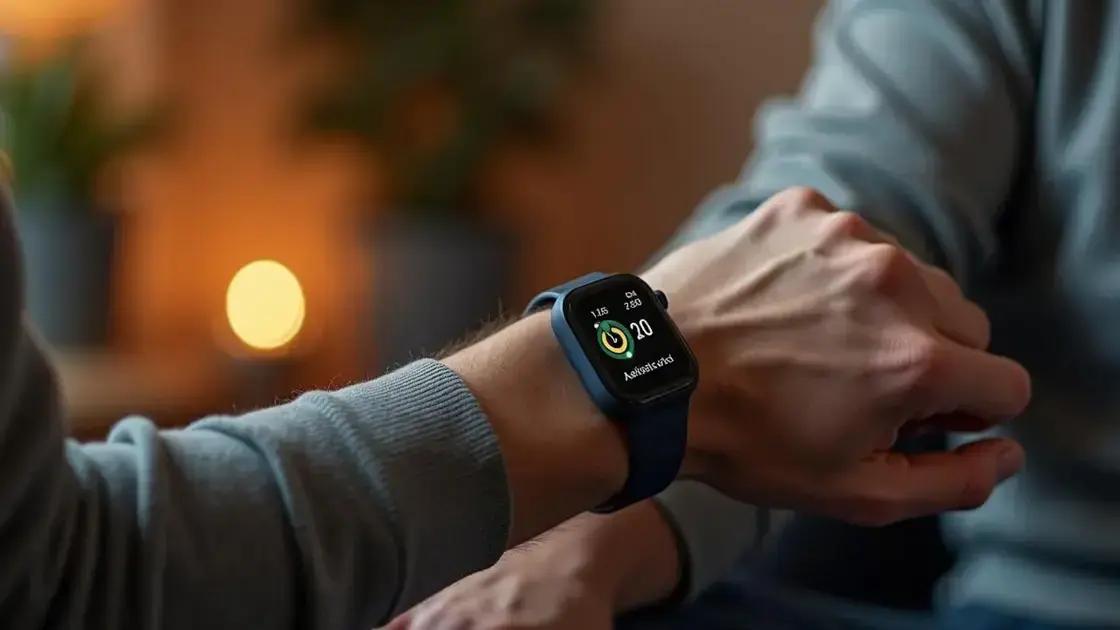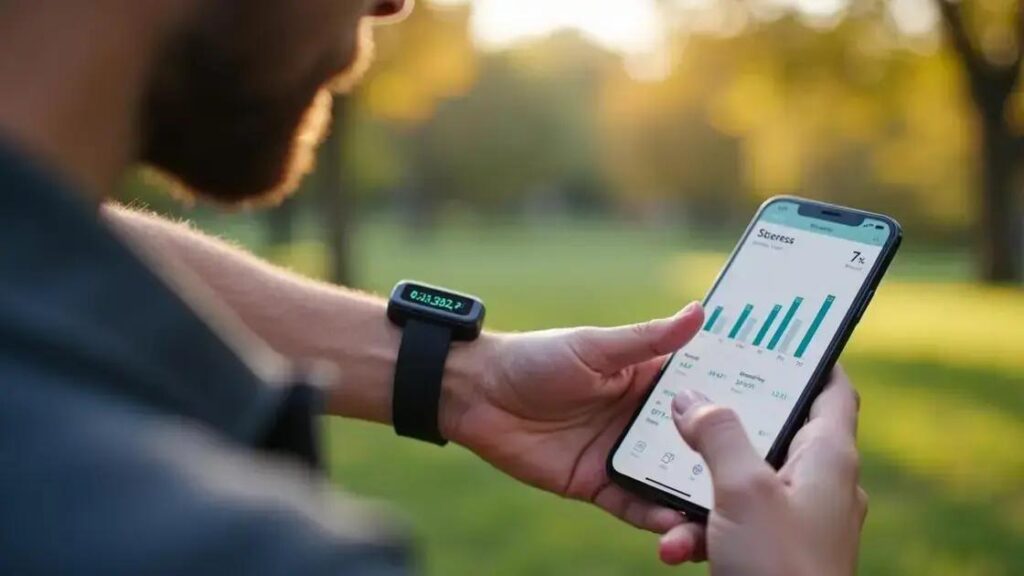Wearable stress monitors help support men’s mental health by tracking physiological signals like heart rate, enabling users to identify stress patterns and manage their stress effectively through technology-driven strategies such as guided meditation and online therapy.
In today’s fast-paced world, wearable stress monitors are stepping up to play a vital role in supporting men’s mental health. These innovative devices go beyond just tracking physical activity; they provide crucial insights into stress levels. By utilizing advanced technology, men can take charge of their health and well-being. This article will delve into understanding wearable stress monitors, their impact on mental health, and real-life success stories showcasing their effectiveness.
Understanding Wearable Stress Monitors

Wearable stress monitors are devices designed to track physiological signals that correlate with stress levels. These monitors utilize various sensors to measure metrics such as heart rate, skin temperature, and sweat production. By analyzing these data points, the devices can provide real-time feedback about a user’s stress status.
How They Work
Wearable stress monitors typically integrate with smartphones or apps, enabling users to view their stress levels throughout the day. Some devices can alert users when stress thresholds are crossed, allowing them to take proactive measures to manage their stress.
Types of Wearable Stress Monitors
Common types of wearable stress monitors include smartwatches, fitness trackers, and specialized devices designed specifically for stress management. Each device offers unique features, such as guided breathing exercises or meditation sessions, tailored to help users mitigate stress effectively.
Benefits of Using Wearable Stress Monitors
By understanding their stress patterns, users can identify triggers and develop strategies to cope with stress better. These insights can help promote mental health and well-being, as individuals became more aware of how their lifestyle and activities impact their stress levels. This increased awareness can lead to healthier habits and improved mental resilience.
The Impact of Stress on Men’s Mental Health

Stress can have a profound impact on men’s mental health. Men often face unique pressures related to work, family, and societal expectations, which can lead to high stress levels. Chronic stress can escalate into serious issues such as anxiety, depression, and other mental health disorders.
Physical and Emotional Effects of Stress
When under stress, men may experience physical symptoms such as headaches, fatigue, and increased heart rate. Emotionally, stress can cause irritability, mood swings, and difficulty concentrating. Over time, these effects can accumulate, leading to more severe mental health issues.
The Role of Societal Expectations
Societal norms often dictate that men should be strong and self-reliant, which can hinder their ability to seek help. This stigma may discourage them from discussing their feelings or reaching out for support. The pressure to conform to these ideals can amplify stress and delay recovery.
Importance of Addressing Stress
Understanding the impact of stress on mental health is crucial for men. It can help them recognize the signs early and take action before issues worsen. Domestically, men facing stress are more likely to turn to unhealthy coping mechanisms such as substance abuse or isolation.
Promoting Open Conversations
Encouraging open dialogue about stress and mental health is vital. By fostering supportive environments, men can feel more comfortable sharing their experiences and seeking help. This shift can ultimately lead to healthier coping strategies and improved mental well-being.
How Technology Can Help Manage Stress

Technology plays a crucial role in managing stress. Various tools and applications are designed to help individuals monitor and reduce their stress levels. From wearable devices to mental health apps, technology offers valuable resources for stress management.
Wearable Devices
Wearable stress monitors provide real-time data on physiological indicators such as heart rate and sleep patterns. By tracking these metrics, men can become more aware of their stress triggers and make informed decisions about how to handle stress in their daily lives.
Meditation and Mindfulness Apps
Many smartphone apps focus on meditation and mindfulness techniques. These apps guide users through exercises that help reduce anxiety and improve focus. Regular practice can aid in achieving a calmer state of mind, promoting overall mental well-being.
Online Therapy Platforms
Technology has made therapy more accessible through online platforms. Men can connect with licensed therapists from the comfort of their homes. This option reduces the stigma around seeking help and provides crucial support during stressful times.
Stress Management Programs
Numerous online stress management programs offer courses and resources designed to teach men coping techniques. These programs cover a variety of subjects, including time management, relaxation strategies, and emotional resilience. By participating in such programs, individuals can gain tools to better handle stress and improve their mental health.
Real-Life Success Stories

Real-life success stories highlight how wearable stress monitors have positively impacted the lives of men struggling with mental health issues.
Case Study: Mark’s Journey
Mark, a 32-year-old engineer, struggled with anxiety at work. He decided to use a wearable stress monitor to track his stress levels throughout the day. The immediate feedback helped him recognize patterns. When he noticed rising stress levels, he took breaks or practiced deep breathing exercises. Over a few months, Mark reported feeling more in control and less anxious at work.
Case Study: David’s Transformation
David, a 45-year-old father, faced challenges with balancing work and family life. He began using a stress monitor to measure his physiological responses to daily stressors. The data showed that family interactions often triggered his stress. Armed with this knowledge, he set aside dedicated family time and engaged in mindfulness practices. David found that these changes improved his mental health and strengthened family bonds.
Case Study: Alex’s Story
Alex, a college student, used a wearable device during finals week. The monitor alerted him to elevated stress levels from lack of sleep and studying. Recognizing the need for change, he implemented a better sleep schedule and used meditation apps. These adjustments helped him cope more effectively during the high-pressure period, leading to improved grades and overall well-being.
Community Sharing
Many users share their experiences online, forming communities that offer support. By discussing their unique stories, they encourage others to utilize technology for managing stress. These narratives inspire men to take action, showing that wearable stress monitors can make a tangible difference in enhancing mental health.
In Conclusion: Embracing Technology for Mental Well-Being
Wearable stress monitors have proven to be transformative tools for men seeking to improve their mental health. By accurately tracking stress levels, these devices empower users to take charge of their well-being. As explored through real-life success stories, individuals like Mark, David, and Alex demonstrate how technology can provide insights that lead to significant lifestyle changes.
Moreover, the integration of technology in stress management, such as meditation apps and online therapy platforms, further enhances the support available to men. By fostering open conversations about mental health and embracing digital tools, society can help break down stigmas and encourage more men to seek assistance.
Ultimately, the combination of awareness, community sharing, and technology creates a pathway for improved mental health. Men can better navigate their stressors, leading to healthier, more fulfilling lives.
FAQ – Frequently Asked Questions about Wearable Stress Monitors for Men’s Mental Health
What are wearable stress monitors?
Wearable stress monitors are devices that track physiological signals, such as heart rate and sleep patterns, to provide feedback on stress levels.
How can wearable stress monitors help improve mental health?
They help users become more aware of their stress triggers and patterns, allowing them to implement strategies to manage stress effectively.
Are there specific apps that work with wearable stress monitors?
Yes, many devices come with companion apps that provide insights, stress management techniques, and guided exercises to help users cope with stress.
Can wearable stress monitors detect stress in real-time?
Yes, many wearable devices provide real-time data and alerts when stress levels rise, empowering users to take immediate action.
What other technologies can assist in managing stress?
In addition to wearable monitors, meditation apps, online therapy platforms, and stress management programs offer great resources for coping strategies.
Do real-life success stories exist for using these devices?
Absolutely! Many individuals have shared their success in managing stress and improving their mental health through the use of wearable stress monitors.












